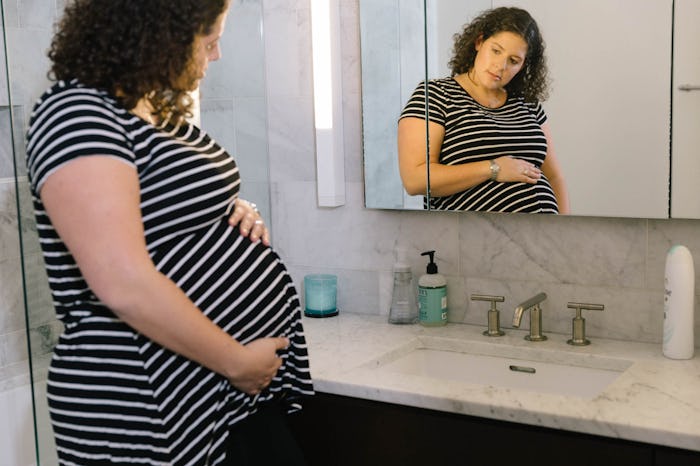Life
If Your Due Date's Come & Gone, Here's When Your Doctor May Mention An Induction
I've only had one baby go past his due date — and that was one too many for my taste. My midwife finally got things going by stripping my membranes for the second time (she had tried once the week prior), so I didn't have to have a formal induction. But this week a mom friend on my block sailed past her due date and told me she'd started dreaming of pitocin. Which left me wondering, when do they induce labor if you're overdue? Because my neighbor looks ready to pull the trigger.
First of all, what exactly happens in an induction? California OB-GYN Dr. Thomas Ruiz explains that an induction can mean one of two things: Either a softening of the cervix to allow contractions to begin on their own, or using an IV medication to create the contractions. "Cervical ripening agents can be either medications which contain prostaglandins or a mechanical device such as a Foley balloon or Cook balloon," he tells Romper. "While pitocin is the medication given through IV."
Santa Monica OB-GYN Dr. Sherry Ross says that while most inductions are medically necessary, "elective inductions" are not uncommon when a woman nears or passes her due date. Elective inductions may be considered between 39 and 42 weeks gestation if the conditions of the cervix are favorable — meaning thinned out and dilated — she says.
"Favorable conditions are critically important for achieving a vaginal birth within a reasonable frame of time," Ross tells Romper. "If the cervix has not begun thinning out and dilating, the process of an induction may take days or result in a cesarean section."
Many medical professionals caution women against electing for an induction before 42 weeks to avoid putting the baby at unnecessary risk. "Up until 42 weeks is a perfectly normal time to spontaneously begin labor," says midwife and maternity consultant Kathy Fray. "Post-date inductions should not commence until the pregnancy is around 41 weeks and six days."
There are a few circumstances that do not allow for an induction, regardless of whether you want one or not. According to Ross, your medical provider will not perform an elective induction in the case of umbilical cord prolapse, an active genital herpes infection, a placenta previa, if the baby isn't positioned head-down, or if you've had a previous myomectomy (fibroid removal from uterus).
But for many, the decision of whether or not to induce labor is one the mother has the chance to make for herself — a decision Fray says is often taken much too lightly. "Inductions should truly should only ever occur for sound evidence-based medical indications," the childbirth expert tells Romper. "Because doing so takes the labor from being low risk to being high risk."
Worsening pregnancy-induced hypertension (PIU) or intrauterine growth restriction (IUGR) are serious medical reasons for induction, says Fray, but many women inquire about being induced because they're simply sick and tired of being pregnant. No one can blame them of course, because the end of pregnancy is the absolute worst, but there's more to think about in making the decision.
"The oxytocin-drip augmented contractions are tougher on the mother and can even be tougher on the baby than ordinary contractions," explains Fray. "So the need for epidurals and/or presence of fetal distress is increased, which then increases the rate of C-Sections."
Fray says she frequently sees recommendations for induction in cases of advanced maternal age or babies who are measuring large in the womb, but that neither factor automatically necessitates the procedure. In fact, there are few circumstances that truly require induction, and for the rest of us its usually a matter of simply waiting for baby's timeline and not our own — which is easier said than done. Just ask my neighbor.
